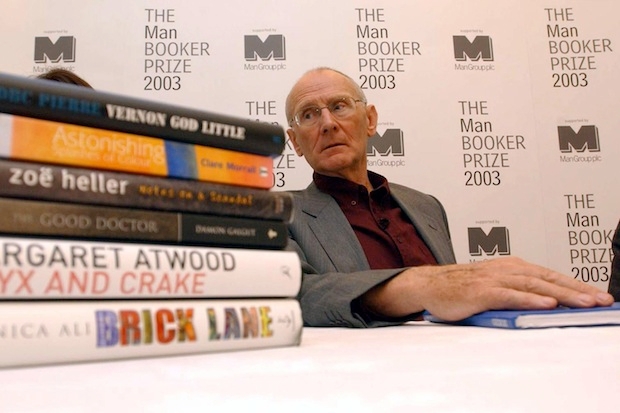It’s a misleading title, because there is nothing unexpected about Professor Carey, in any sense. He doesn’t turn up to parties uninvited, like some of his less organised colleagues. As for his appointment, he was tailor-made for the job. Right class (middle); right school (grammar); right military service (guarding sand); right religion (books). An unsullied record of diligence as undergraduate, graduate, lecturer and tutor was combined with engaging resilience: ‘Teaching at St John’s was so enjoyable that I felt it was wrong to be paid for it.’
His outlook was just right for 1974; he was against ‘Old Oxford’, public schoolboys, compulsory Anglo-Saxon and all manifestations of waste, idleness and privilege. What he calls his ‘leftist leanings’ were no disadvantage. He had to dine out in the former Duchy of Oldenburg to find a ‘senior academic’ sufficiently diehard to be offended by them. His cottage in the Cotswolds was entirely comme il faut, and translating Milton’s De Doctrina Christiana with a cat on his shoulders was a positive recommendation. It is a very unorthodox work and we were all Roundheads in those days.
It was hoped by some that once he became a professor, such a cold and bitter wind would be blowing on the Oxford Faculty of English as never blew on Oxford yet. A good many of us might wither in its blast, but ‘a cleaner, better, stronger faculty will lie in the sunshine when the storm is passed’.
They call it ‘syllabus update’, and 40 years on it doesn’t seem to have made any faculty cleaner, better or stronger. They are all conspiracies of drudges with intrusive box-wallahs. Not at all what Carey had in mind; for the job of professor did not give him the power to remake the other English dons in his own image. As this semi-autobiographical work reveals, there is much more to Carey than his qualifications as an academic reformer, and some of that is ‘Old Oxford’, subject to the illusion that our private lives and small wars are of interest to the outside world; fit to be commemorated in varsity memoirs consisting of anecdotes, gossip and character sketches.
Amateurs of this branch of literature will be pleased to meet members of the cast yet again: Bryson and Dyson and Davidge the savage, Garrod and Harrod and Mure, for a start. They will be happy to follow the rising don in detail: his tutors, his rooms, his houses, his neighbours and colleagues, his roses, his vegetables, his book sales, even, conceivably, his brushes with the great and famous, bearing in mind that this is an author who has declared war on the cult of celebrity. It’s all charming, if that is not too harsh a word.
Others will prefer to remember the published work, which had so many of us writhing and laughing for so many years. The intellectuals, whom he found undemocratic in sympathy, exclusive and arcane in language, the Bloomsbury set, the Leavisites, the modernists, the aesthetes, and anyone found deficient in the common touch, all have been scoured with Carey’s caustic soda.
Not that The Intellectuals and the Masses has slowed the march of critical mumbo-jumbo by any sort of ‘Fall out for a smoke, lads’; and readers even of the Times Literary Supplement may have noticed. Nor did What Good Are the Arts? offer a cogent answer to the question, to judge by the persistence of arguments that book demolished. Too many subsidies, too much private wealth, hang on that pious fraud, if that is what it is: that art has transcendant value, which makes it both a religion for the public and a treacle-mine for the investor and ancillary trades.
The Unexpected Professor will not disappoint those who enjoy the combative Carey, but its theme is intellectual awakening, and the books, great or not, that have made life worth living. The Oldenburg professor might have called it Geistesgleichgestimmtheitsentwicklung, because sympathy both with authors and with readers is Carey’s great virtue, however carelessly applied, and it raised many of his one thousand book reviews for the Sunday Times well above the mark for most of us hacks.
His love of Chaucer, Tyndale, Shakespeare, Milton, Pope, Thackeray, Browning, Tennyson and Orwell proves to be still fervent, unmodified by his appreciation of Biggles, Alphonse Daudet, Rilke, Dutch painting, Frank Muir’s Kentish Lad, Shaw’s Saint Joan, the chemist who invented the colour mauve and the Dome of the Rock of Jerusalem, to mention a few — though not the New English Bible, on which he collaborated, but ‘whenever I hear it read in Chuch now, I wince’.
He claims that while he lay in hospital as the result of taking the wrong anti-malarial pills, he was tormented by demons: ‘Horribly knowing demons, privy to all the most disgraceful, disgusting and ridiculous things about me’. Those who would like to read more about those things will not find them here. There is an inescapable touch of the virtuous apprentice about this self-portrait. However, ‘like all criticism of art or literature, my judgments are camouflaged autobiography’ or so Carey wrote in What Good are the Arts? Which might explain why some consider that ‘he’s wrong about everything’. Perhaps; but with Carey, being wrong is no dishonour.





Comments